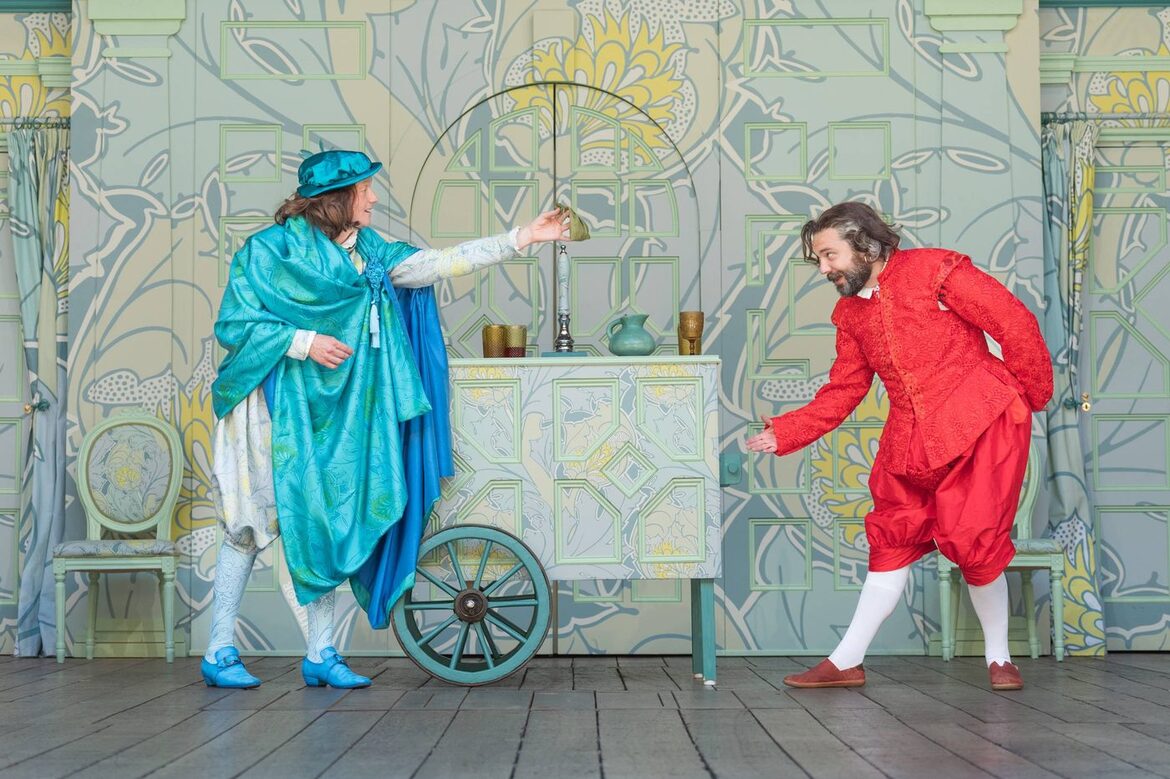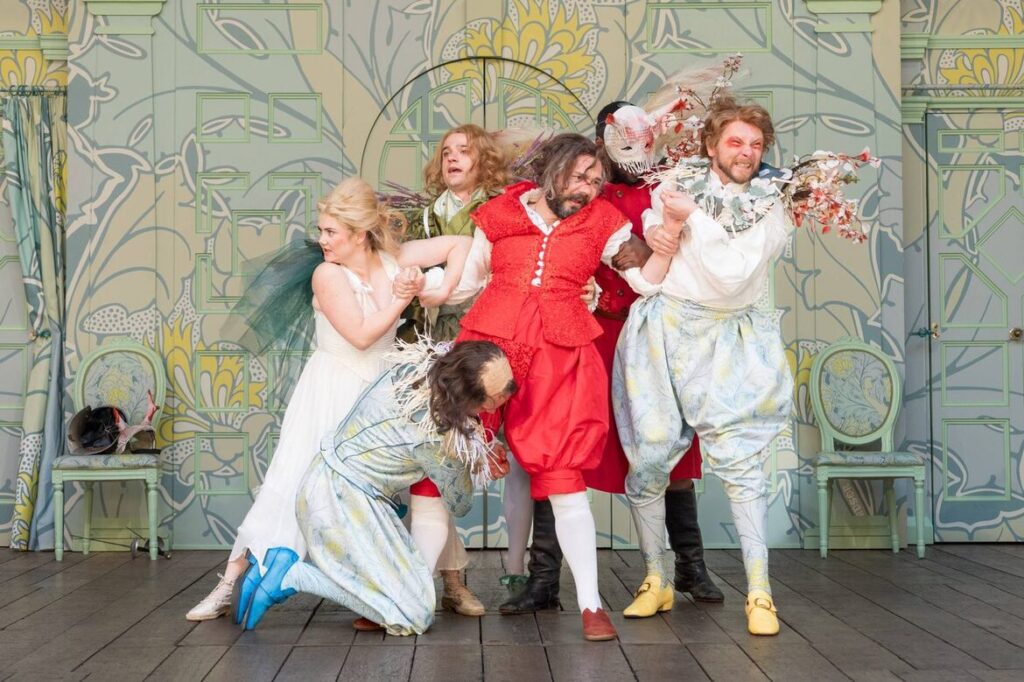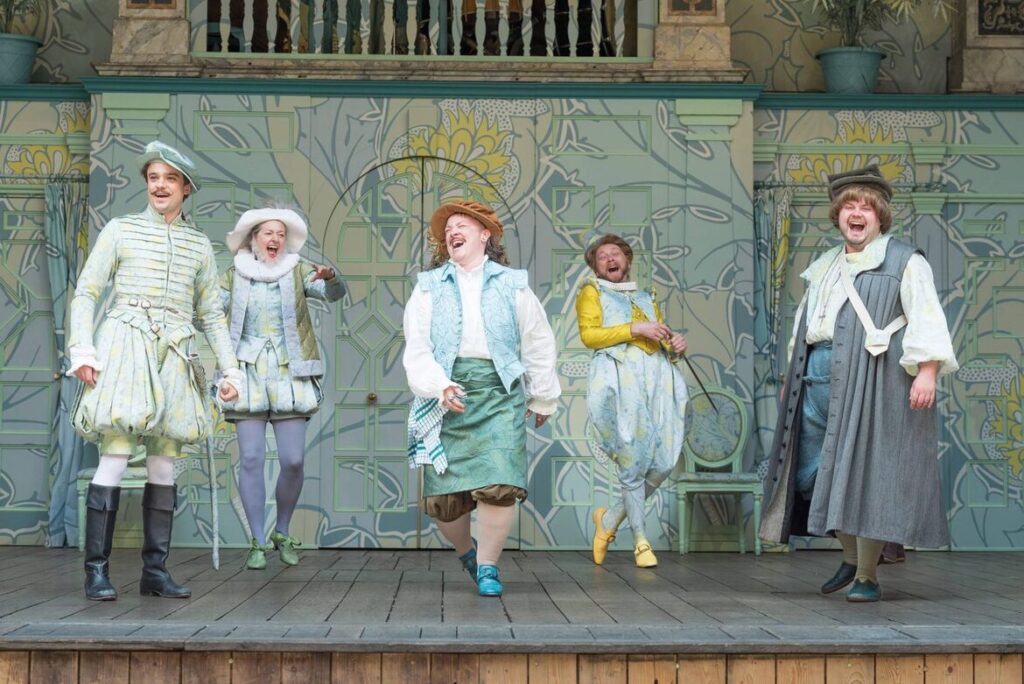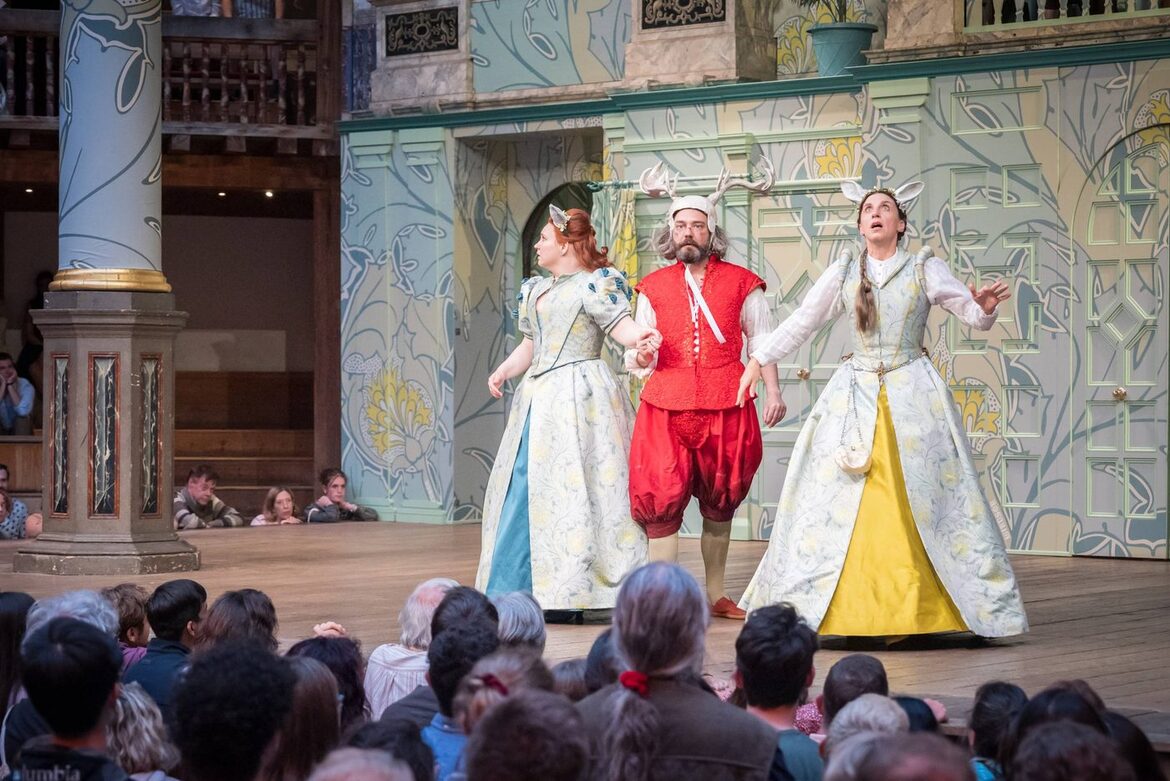Review by Simon Jenner, July 17 2025
It’s not often a convincing darkness mingles with the yarn of Shakespeare’s silliest dashed-off-to-order play and still delight. Indeed darkness isn’t even more than hinted usually. Yet this is what the Globe’s latest The Merry Wives of Windsor delivers, directed by Sean Holmes (with assistant director Naeem Hayat), till September 20th.

Jolyon Coy (as Brook) and George Fouracres. Photo Credit: Marc Brenner
First an inspired, not deer-fattened Falstaff in George Fouracres sets off a raffishly charismatic knight, not obviously repellent, and that’s key here. Fouracres’ aplomb, never guying Falstaff’s charm nor underpaying it, exudes. He also radiates a dignified pathos, one of realising his humiliation right from the first basket-toss and never quite the same exuberant shrugger-off thereafter.
With Grace Smart’s set and costume design Falstaff’s also in a sumptuary law danger-zone. He’s oddly blazoned in expensive scarlet, as is Nym briefly. It marks Falstaff as court outsider against the tightly colour-coded William Morris/Laura Ashley set, all interior design as outdoors wrapped around pillars and upstage. A mint colour with lozenged canary yellow and teal then bleed into the clothes others wear. That mint’s under-skirted yellow for Page, teal for Ford. Their genteel town colours are slashed through in red disturbance. It’s visually and metaphorically arresting. It’s adorned with some delicious Dream-like spookiness with props in the final scene.
There’s a dynamic between and from the Wives wholly different to any production I’ve seen. A normally good-humoured Mistress Page in Emma Pallant’s depiction is steely, somewhere riled and ambitious. You now believe this Mistress Page would push for an ambitious match for her teen daughter. Pallant renders her hard-edged, where the affable Page of Christopher Logan is all youthful nonchalance: again no greybeard. They’re a youngish, locally dynamic couple.
And that goes for the other pair: with a vengeance. It’s believable too, rounding out a pathology to Ford’s famed jealousy. There’s clearly history between a dashing-looking but abusive Ford (Jolyon Coy) who’s quite capable of grabbing his wife’s chin menacingly, and Mistress Ford (Katherine Pearce). Pearce looks reluctant at every clinch. So when both wives discover the infamously replicated letter, there’s subtle reasons why Mistress Ford becomes bait. Whilst Pearce and Pallant enjoy a scintillating exchange based on equal inspiration in the moment, you look at subtext. Because Mistress Ford’s clearly unhappy, inexorably drawn to the knight. There’s no reason for her to initiate a passionate kiss in the first entrapment. Or the second, or thereafter at all. But. Pearce’s compulsively watchable Mistress Ford responds in looks and body-serves, as well as sudden movements: she tells us everything.
Ensemble. Photo Credit Marc Brenner

There’s some first-rate switching too. Adam Wadsworth’s pernickety Doctor Caius as well as Slender with a Python-esque Ministry of Pigeon Walks is a delight. In the doctor, he’s all fussy Franglais (Shakespeare’s mild crowd-pleasing xenophobia here on stilts) with his “by Gar” and other innuendos (a higher quotient of genitalia jokes than anything after Mercutio). As Slender, Wadsworth’s almost aphasic, a lobotomised piece of AI malware, wound up to woo, and eager to wind down again into silence. Wadsworth’s outstanding in both roles. Sophie Russell’s Shallow struts fretfully but her Mistress is given life here, fusing over Falstaff and everyone else, and getting some of the best laughs as she affects preference, then doesn’t, a kind of Elizabethan Pollard-esque “but yes but no but yes”.
Slender’s guyed into scorn by provocative Danielle Phillips as Anne Page (and briefly Robin the bobbing and truculent Page). Phillips hasn’t got too many lines but enjoys them with an archness and an ardour that lends a much to young love as the part allows. She clearly responds to Marcus Olale’s striking Fenton (he’s also sullen scarleted Nym). Olale’s equally ardent and commanding address makes you hope he’ll return here too in something larger. Hugh Evans (Samuel Creasey) comes into his own trying to rouse songs and lesson boys in Welsh Latin: William Page is alternated impishly between Odhran Riddell and (on this occasion) Alexander Shaw.
The role of Host is often meant to be commanding of local disputes and arbitration. LJ Parkinson (who takes Pistol briefly) in fact suggests this rather more than the pay allows any man: since the two women are effective moral agents and seem both harder-headed and more convincing as they take charge. Rugby (Corinna Buchan), and Tré Medley’s Simple are able to project weary presence.
This is a world of local pomp and oompah. Frew’s music is a mix of Elizabethan sackbut pomp coloured locally, and small riveting moments of mood music. Would there were more of it. It cuts through with two trumpets in an ensemble led by Zands Duggan.
Holmes conjures the most intelligently re-thought Merry Wives of recent years with a convincing take on Mistress Ford. It answers some disagreeables that in Keats’s phrase don’t evaporate. The same too for a steelier Mistress Page. It’s their story, and Pearce and Pallant refresh a take that had slid more into Essex than a wily, edgy Windsor. And comes up funnier, probably sadder. The last few gestures in this show change everything that might follow.
Musicians: Composer Frew, MD/Percussion Zands Duggan, French Horn Alys Jones, Sousaphone/Tuba Barnaby Slade, Trumpet Clara Hyder, Trumpet Tom Harrison
Movement Director Tamsin Hurtado-Clarke, Fight & Intimacy Bethan Clark
Costume Supervisor Jacquie Davies, Text Consultant Simon Trinder, Voice Coach Gary Horner
Globe Associate – Movement Glynn MacDonald, Head of Voice Tess Dignan, Head of Production Wills, Head of Stage Bryan Paterson, Head of Wigs, Hair and Make-up Gilly Church, Head of Wardrobe Emma Lucy-Hughes, Head of Company Management Marion Marrs, Head of Props Emma Hughes, Casting Becky Paris CDG. Producer Tamara Moore.
Ensemble. Photo Credit: Marc Brenner



